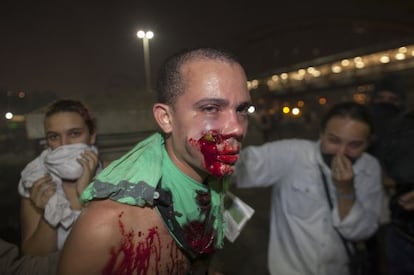March organizers call off demonstrations in São Paulo
Groups with other interests have infiltrated protests, says Free Pass Movement Violence breaks out in Rio de Janeiro, Brasilia and other cities

Organizers of the massive marches across Brazil announced on Friday that they were temporarily calling off demonstrations in São Paulo to evaluate what they said were infiltrations by interest groups who are using the protests “for other purposes.”
The Free Pass Movement (MPL), which was organized by university students and held its first demonstration on June 7 to protest government hikes for public transportation tickets, said that conservative groups, such as anti-abortionists, are joining in to help get their message across.
“We believe that these groups who have infiltrated our marches for other purposes don’t represent us,” said Rafael Siqueira, one of the MPL leaders. “There are a lot of people from the right, with demands we don’t agree with, who are taking advantage of these demonstrations.”
The decision to call off the demonstrations came after around 110,000 people converged on a central artery in São Paulo on Thursday night.
MPL organizers also denounced that leftist groups have tried to take over some of the marches.
About 100 members of the ruling Workers Party (PT) had to abandon an attempt to join the marches in São Paulo after demonstrators hurled insults and threats at them for two hours, and burned party flags.
“The cancellation of the demonstrations has nothing to do with the participation of political parties,” said Siqueira, who added that the MPL was an independent group with no political affiliation.
While Thursday night’s turnout in São Paulo was mostly peaceful, demonstrations in Rio de Janeiro, where some 30,000 poured out onto the streets, turned volatile. At least 60 people were injured and about a dozen were arrested after violent clashes broke out between police, who fired tear gas at some protestors, and the demonstrators.
On Wednesday, government officials in São Paulo and Rio announced that they would cancel plans to raise public transportation fares by 20 cents, or about 0.07 euros. Similar decisions were taken across 14 other cities earlier in the week in an effort to defuse the protests.
Even President Dilma Rousseff offered some conciliatory remarks by saying in a televised speech on Tuesday that she had heard the protestors’ demands. But those gestures were not enough to keep the people off the streets.
As well as in Rio, law enforcement officers battled with violent groups in Porte Alegre, Salvador de Bahía, Campinas, Bélem and Brasilia.
In Ribeirao Preto, a town located some 313 kilometers from São Paulo, an 18-year-old was killed after he was hit by a driver who tried to break through a police barrier. Three others were injured.
In Brasilia, police used tear gas to keep a large group of demonstrators from trying to take over Congress.







































